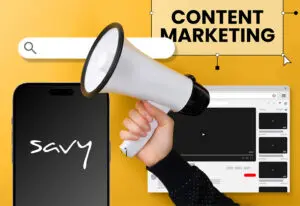
Using ChatGPT for Marketing? Here’s What the New A.I. Can and Can’t Do
Everyone is talking about it. Open AI’s language tool called ChatGPT is turning heads in more than one industry, especially marketing. Why? Well, it’s great at writing— really great. And while we’re familiar with AI in the form of self-driving cars, online editing tools like Grammarly, and virtual assistant technology like Siri and Alexa, this software is doing more comprehensive things. With a simple text prompt, it responds in some very human-like ways. ChatGPT for marketing can write code or long-form content like blogs or essays.
Ask it a question, and you’ll get a highly intelligent response on several topics. Since the AI can’t know when it’s giving you biased or incorrect information, we suggest that marketers using this tool take caution. In its early stages, automated content creation will need gatekeeping for quality control.
So first, let’s look at what this amazing new tool can and can’t do.
What Is ChatGPT, Anyway?
ChatGPT is an artificial intelligence program that uses machine learning to analyze questions by the user and produces a response from its body of accumulated knowledge. But ChatGPT is no ordinary chatbot. It can understand syntax and certain subtleties in human language like no other artificial intelligence platform. So what does this all mean for all marketers who rely on the power of language? Let’s find out!
What ChatGPT Is Good At, Marketing-Wise
Let’s start with ChatGPT’s many capabilities. Writing code or original prose. Answering questions. Creating an outline. Clearly explaining a complex topic. This has the potential to revolutionize the content generation space in the many ways it mimics what marketers all do daily on behalf of clients. In addition, ChatGPT’s amazing ability to interpret data makes it a strategic tool used for these content mediums:
- Email campaigns
- Lead scoring
- Customer service
- Keyword research
- Personalization for target audiences
- Market research
But, like every new technology, ChatGPT isn’t perfect. Guidance and discretion are still required to make sure your marketing strategy is on point.
ChatGPT for Marketing? Here’s When You Should Use an Agency Instead
ChatGPT is a tool for the here and now, but it’s not the best with making future predictions. Open AI includes its stated limitations with these disclaimers:
“Limited knowledge of world and events after 2021”
“May occasionally generate incorrect information”
“May occasionally produce harmful instructions or biased content”
While ChatGPT is brilliant for idea generation around a topic and for information gathering, it isn’t exactly a mastermind with important nuances or complex decisions.
Creative Strategy and Nuances Are Better Left to the Pros
If you’re looking for marketing pros with experience in your industry and the chops to create something disruptive or different, there may be a better way to go than an online chat tool. This is where a team of expert creatives comes in handy.
Establishing naming and brand identity, market positioning, and gut instinct are all parts of a larger, more comprehensive understanding of working with similar clients in the same industry. While the approach is largely data-informed, many decisions come down to a gut instinct based on experience. ChatGPT, while impressive, does not possess gut instincts for your brand, but marketers do.
Understanding Human Emotions and Behaviors
Part of what we appreciate about a powerful marketing campaign is how it makes us feel something. Joy, excitement, awe, and empowerment are all the secret sauce to creating messaging that resonates with an audience. While ChatGPT might explain human emotions or behaviors, it doesn’t embody them, and may convey this limitation in its content creation.
Often, brands come to us with concerns about specific terms, associations, or sensitive issues they need help navigating in their language. Unfortunately, ChatGPT not only doesn’t understand this, but is occasionally responsible for producing biased or sometimes harmful language because of its inability to tell what is appropriate for specific circumstances. If you need tastefully-positioned brand guidelines, relying on the instincts of actual humans is the way to go.
Considering the Stakeholders’ Priorities
Usually, the stakeholders for most brands have very little time to get into the nitty-gritty of marketing campaigns. So it’s the job of a marketing agency to understand their goals and speak effectively to what they care about. Whether it’s boosting qualified leads, relaunching a brand, or turning on a paid advertising strategy, great marketers advocate for the stakeholders needs first.
Similar to understanding human emotions, this aspect of marketing is a tricky one to automate. Advocating for stakeholders starts with solid client relationships. It also assumes the ability of a marketer to anticipate future needs or respond to an opportunity or problem. Humans are still solidly the most capable and effective at these tasks.
Looking to Experiment With ChatGPT for Marketing? Get a Marketing Team Who Is Using It
At Savy, we stay on top of emerging trends and industry tech. We do our jobs more effectively when empowered by automation in all its forms. Grammarly is an example of an AI tool we use to catch spelling or syntax errors. We also use scheduling automation for social media posts and interact with ChatGPT for help with understanding niche industry topics. In the end, there isn’t a substitute for human decision-making. So if you’re looking for a marketing agency with good gut instincts, and an ability to pivot and respond to last-minute changes with the help of automation, Savy is a great place to start.
Recent Posts
The Brand Naming Process: How Strategy and Creativity Build Lasting Equity
A strong name is the foundation of your brand’s identity. It shapes first impressions and creates the equity your business will build on for years. The brand naming process is […]
The Future of SEO With AI: Human Intent Meets Machine Learning
Quick Answer The way users find and engage with content has shifted, driven by artificial intelligence that predicts behavior and personalizes results in real time. Search is evolving faster than […]
The Benefits of Brand Loyalty in the Age of Micro-Communities and Micro-Influencers
Quick Answer Audiences have traded mass brand followings for smaller, values-driven spaces where authenticity thrives. The marketing landscape has shifted. Audiences have traded mass brand followings for smaller, values-driven spaces […]
Trends, Tech, and Takeaways: Applying 2025’s Lessons to Your New Year Marketing Campaigns
2025 has been a year of bold shifts and rapid adaptation. Marketers faced new challenges, tested new tools, and learned fast. As the year closes, the smartest brands are already […]




